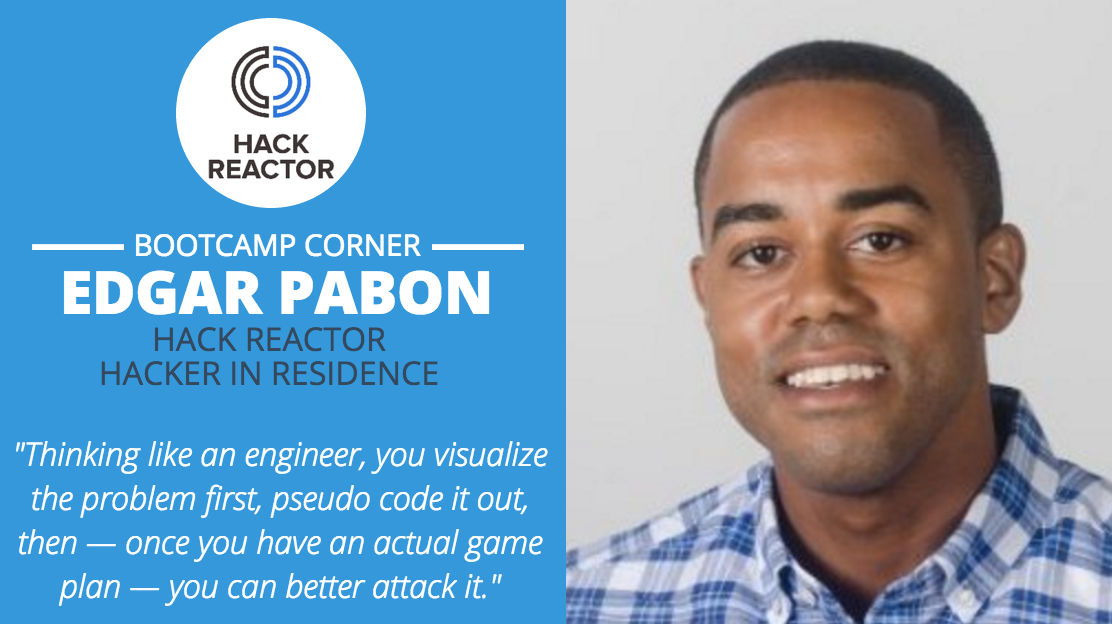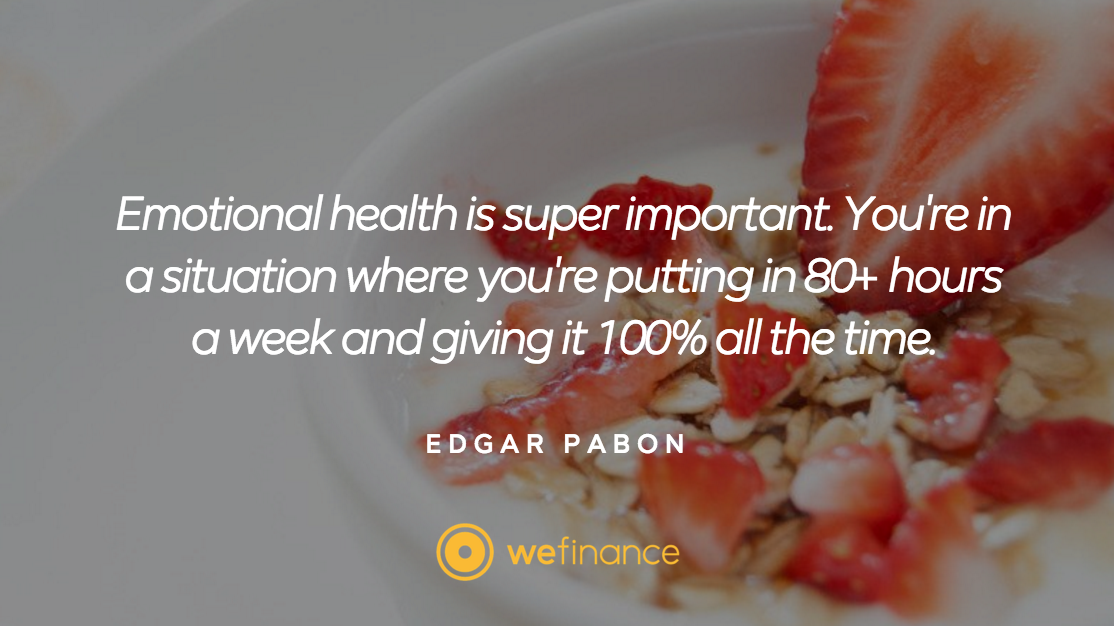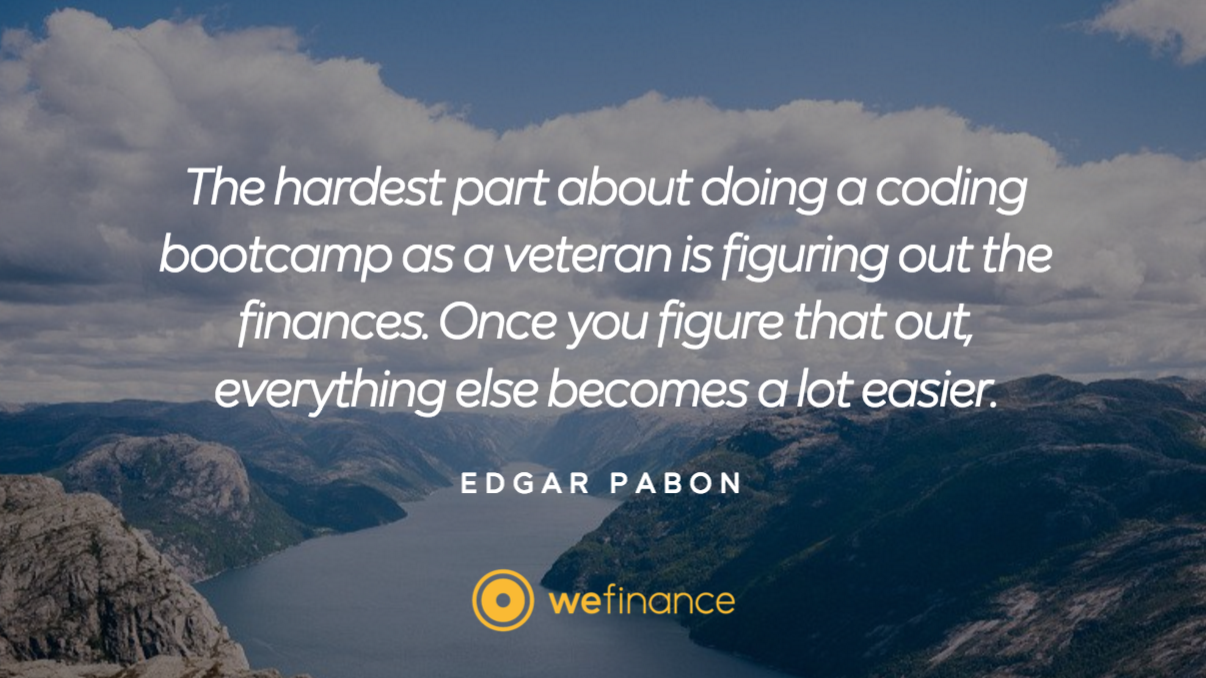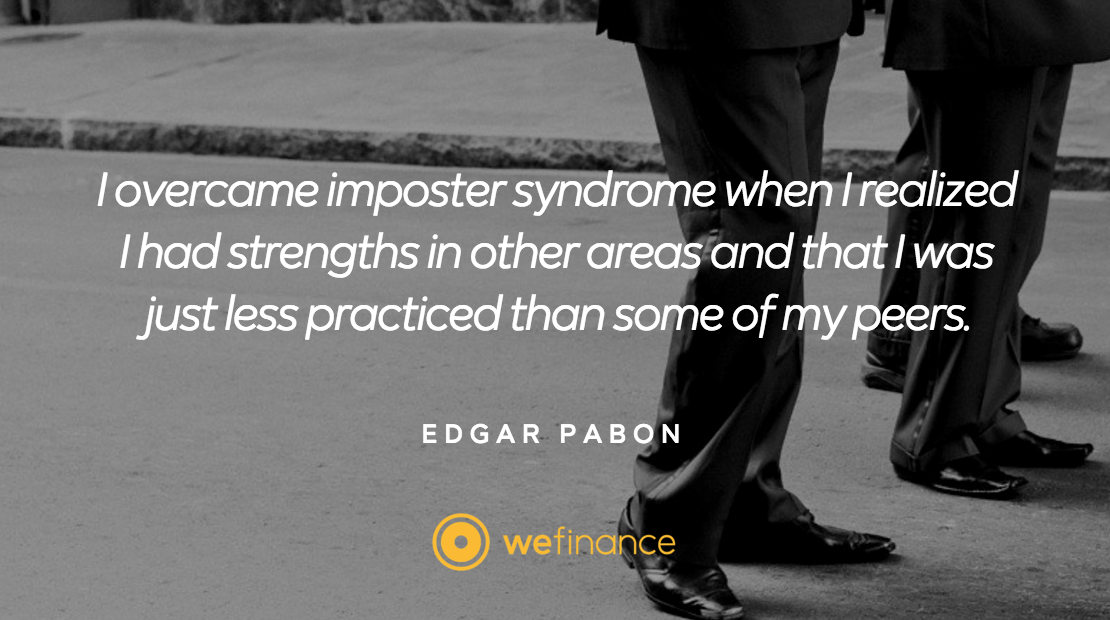Bootcamp Corner with Edgar Pabon

Edgar Pabon is a Hack Reactor graduate turned Hacker in Residence. He talks about transitioning from the army to tech, his experience at a coding bootcamp, and how to deal with imposter syndrome.
Are you considering a bootcamp but worried about the tuition or living expenses? WeFinance for Bootcampers is the fastest way to crowdfund a personal loan.
What were you doing before Hack Reactor?
Before Hack Reactor, I was in the army and served on active duty as an Army Officer. I got to work with tank units and scout units. I got out of the army in late late 2014 and used the GI Bill to study in Mexico. During my time there, I got into Hack Reactor and decided to drop everything and come out to San Francisco!
How did you find out about Hack Reactor?
I taught myself coding awhile ago by doing courses through Codeacademy and Code School but, at some point, I ran into a wall. I was searching for resources online and started seeing topics about coding bootcamps; I eventually found out about Hack Reactor due to their reputation within the coding bootcamp space.
What was the application process like?
Pretty intense. You have to do a coding challenge on the website to even schedule a technical interview. The coding challenge isn’t too difficult but there’s a huge gap between the coding challenge and the technical interview.
The technical interview puts you through the ringer, especially if you haven’t been programming for a very long time since it includes concepts that are difficult to grasp.
I guess you’re able to see what it feels like on the other side of the table now as a Hacker in Residence?
A lot of Hacker in Residence help with technical interviews but in my specific role, I’m acting as a Shepard. For the current batch of students going through, I’m the primary contact for technical and emotional support.

How important is the emotional support element?
Emotional health is super important. You have to think about it in the context of a lot of people who are away from home and dropped into a stressful situation. Most people aren’t from the Bay Area and are coming from different states or even different countries; they’re suddenly in an environment where they’re working from 9am in the morning to 8pm at night, 6 days a week (and often people are staying much later than this).
You’re in a situation where you’re constantly grinding, putting in 80+ hours a week, and that can be very frustrating, especially if you’re giving it 100% all the time. A lot of people struggle — they go through periods where they just need support.
I’ve heard that the Hack Reactor network is very supportive even after the program. Have you found this to be true?
I certain think so. From everything I’ve seen and heard, it seems like they go above and beyond with things like outcome support. Hack Reactor has a very well connected and deep network; I’ve been constantly amazed at how great the network and community is with things like employment, learning, or even just events like hackathons.
You mentioned that students came from across the U.S. and the world, were there any clusters from certain places?
It really runs the gambit and you’ll have people from Europe, China, and all around the world. In my class, we had 2 people fro New York and a ton of people from Texas, but I don’t think there’s a typical class demographic.
Can you tell us more about the Remote Beta program?
The Remote Beta program is geared towards people who can’t or don’t want to move to San Francisco for the program, or who know they don’t want to work in the Bay Area. The benefit of the program is that you do the same exact curriculum as the normal program and it’s held to the same standards in terms of projects. The only real difference of the program is that you’re doing it online instead of in-person. If you’re trying to decrease the overall cost, it makes a lot of sense since you get to avoid the high cost of living in San Francisco.
I’ve spoken with a few veterans looking to move into tech. Do you think there’s a good way for veterans to support other veterans looking to make this transition?
Veterans as a whole are sympathetic to transitioning veterans, especially for programs like coding bootcamps since we know there’s a lot of frustration with the GI Bill not being able to support these types of programs currently.
There’s an active community out there of veterans trying to get into tech but I think it’s difficult since there’s no clear answers and there’s no defined pathways.
There’s groups like Vets in Tech and Patriot in Tech (that’s powered by Techstars) that are looking to solve this problem. They’re super useful since it provides a lot of useful information on things like pitches, how venture capital works, and how to position yourself for a job in technology. I actually had the chance to go to one of the conferences in New York and I found the community extremely impactful.

Do you have any tips for veterans trying to get into a coding bootcamp?
The hardest part about doing a coding bootcamp as a veteran is figuring out the finances. Once you figure that out, everything else becomes easier. If someone was trying to get into a program like Hack Reactor that requires a certain level of competence, I would encourage them to utilize as many resources as they can to get to that level. There are a ton of online resources like Eloquent JavaScript, Code School or Codeacademy’s JavaScript track.
I would also recommend doing problems on sites like Coderbyte or JavaScript Koans to get a feel for coding and to prepare you for the challenges you’ll see in the interviews.
Did you always know you wanted to do JavaScript?
I actually started with Ruby on Rails when I was doing an online bootcamp called Bloc. The program was great and it was helpful to understand the developer mindset but I was reading more and more about JavaScript being the future language of the web. There’s a lot of research that’s showing that JavaScript usage is growing — I figured that if I was going to move into something, I might as well focus on a language that will become increasingly important.
What are your thoughts on thoughts on Meteor as a starting platform?
I really like Meteor but I haven’t played too much with it other than the Discover Meteor book. My thought is that Meteor makes things really simple and it seems like the perfect platform for creating a prototype. My concern with Meteor, and AngularJS is scalability — as your product/app grows, you might have to deal with growing pains related to performances or bugs. It’s a great starting platform to learn and simplify a lot of processes though!
Was it hard to adapt to the developer mindset?
Yes, since it’s a very different mindset and way of thinking about things. It’s been good for me since I’m able to think about other things, like business problems, in a new way.
I think it’s interesting that, instead of attacking the problem right away, you effectively take a step back. You visualize the problem first, pseudo code it out, then — once you have an actual game plan — you can better attack it. Thinking like an engineer, you realize that there’s always trade offs or consequences for your actions. You might be able to get things up faster, but it might not scale as well. It’s balancing good now vs. good later and bad now vs. bad later.
If you could go back in time and give yourself a tip before starting Hack Reactor, what would it be?
I’d probably tell myself not to freak out as much.
I’m used to high stress environments and I was able to manage just fine because, in the back of my head, I knew I would be fine. At the same time, I was still worried more than I should be during the first 6 weeks of the program. I was worried that I wasn’t keeping up or wasn’t doing what I was supposed to be doing. Stress management is extremely important.

Was imposter syndrome an issue for you?
I was alluding to this in my previous answer, but yes, I was dealing with imposter syndrome and I think a lot of people deal with it as well.
When you’re in a program like Hack Reactor, your peers are very intelligent — not just smart, but out of the world smart. It’s not normal to be in a place where you’re surrounded by people who were the best in something in their prior lives.
For a lot of people, it can be intimidating if you see the standouts and they’re just way ahead. Others come in with a bachelor in computer science so they’re breezing through some of the material while you’re wondering why you can’t keep up their pace. In reality, you might be keeping up with the courses but you’re still measuring yourself against a false metric. I think this speaks to the competitive nature of Hack Reactor.
It’s easy to look at that and think, I’m not good enough or I’m not where I should be. The reality is that you’re fine and that you’re still learning. I overcame imposter syndrome when I realized I had strengths in other areas and that I was just less practiced than some of my peers. Once we were in the projects phase of the program, I eventually realized that I was perfectly capable and hat I could solve problems and come up with solutions in the same way as my peers.
How did you find out about WeFinance?
I was searching for financing options for bootcamps and I saw someone mention WeFinance as a funding solution. I liked how it was crowdfunding instead of a loan by a financial institution. I think this aspect is extremely powerful if you think about those who are under-served by banks.
What do you look for when you consider financial products?
I look for credibility and honesty. My biggest goal is to make sure that it’s not a “scam” where they’re trying to look me into a weird payment schedule or try and change the terms or schedule on me. I hate deception. WeFinance appealed to me because of the transparency, that I got to pick the interest rate (meaning it can be lower than any other provider), and the reasonable payment schedule (how I could pick my own terms with a deferral).
What was your experience with WeFinance?
It was a bit more nerve wracking crowdfunding a loan since you need backing and need to be social. I think it’s good training for later in life as you job search and especially if you’re planning to start a company at some point.
It was great to talk to friends and supporters about what I was working on and I felt happy that I could pay them back for their support; that I wasn’t just asking them for free money.
Overall I had a great experience. I raised the money I needed to come to San Francisco for Hack Reactor and it’s been an amazing journey!
Any tips on creating a campaign and making it successful?
You really have to market it and put it out there with friends and family. I know that it’s harder for some people — and it was for me as well — to make your financial situation public. Since you’re making the promise to pay them back through a third-party, and not just some vague promise, it alleviates a lot of concerns for people.
You have to be aggressive and tap your network, LinkedIn, and social. It’s also important to find out what makes your story compelling and to focus on it. If people are moved by your story, they’ll back you even if they’re strangers.